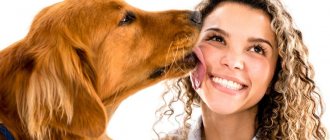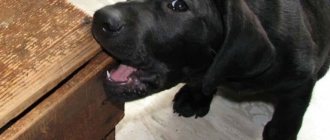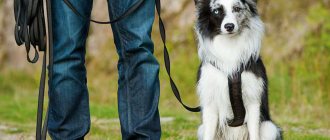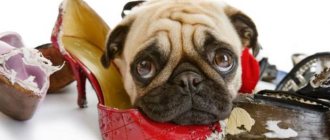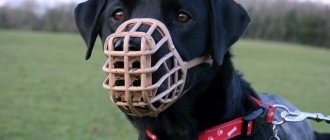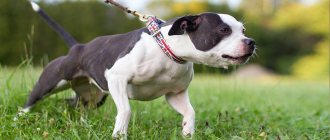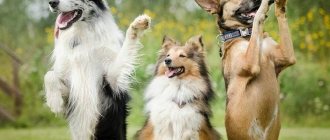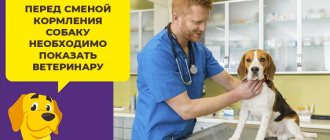Many inexperienced owners don't understand why German Shepherd puppies constantly jump and bite. On its own, even a mature dog is unlikely to stop biting and jumping on its owner. That is why he must know how to wean a German Shepherd puppy from biting in order to prevent sad consequences in the future.
Causes of aggressive behavior
A dog is a pack animal and it cannot be ruled out that when established in the house, in the owner’s family, in order to understand its place in the “pack”, it will display different behavior, including using its claws and teeth.
The main reasons for aggressive behavior are:
- Possessive instinct, appropriation of food. This is the most common behavior of the animal: when approaching a dog that is busy eating, you can hear a warning growl. While eating, it is not recommended to approach your pet; this may be regarded by him as a threat to deprive him of food. The instinct to get food is basic, so the reaction to “encroachment” is usually aggressive.
- Illness, traumatic injuries. Any careless handling of a sick animal, causing it physical pain or putting strong pressure on the damaged area will cause an involuntary reaction on the part of the dog, namely a bite.
- Overexcitement, nervous tension - these symptoms can occur after prolonged play or prolonged physical activity, then the pet has poor control of itself and can cause pain.
- Lack of attention, jealousy of relatives. Lack of attention to your pet and lack of active exercise spoils its character. Against this background, any game with another animal can end in a bite, as if a reminder of its existence.
- Temperament type. If an animal has a “fighting” character, then it will use force to assert itself. This behavior must be corrected from puppyhood.
- Fear. If there is excessive punishment, a raised voice, or in a stressful situation, the dog may respond with aggression and will try to protect itself with its teeth.
- Wrong upbringing. In order for the dog to socialize normally and behave confidently in any situation, classes with him must begin at the age of three months.
Why
So, let's look at why the puppy constantly bites and growls, for example, even when you pet him - what are the reasons for this?
Little puppies love to bite:
- They learn and explore the world , just as little children put everything in their mouths, and puppies bite everything. Exploratory bites are made with the incisors (the side of the mouth), and they are weak, more like clenching. This worries the owners because... they believe that dogs show their aggressiveness.
- Pets can also show their positive emotions and attitude towards people . The owner needs to learn to correctly recognize all the signals and desires of the puppy. In this case, all troubles will be prevented.
- express their dissatisfaction and go into conflict.
- learn to realize their strength.
- perhaps (especially if the breed is a hunting breed) the puppy hunts.
For a person, a dog bite is an understandable reaction. The pet is ready to attack or defend. In these two cases, people understand that they need to stay as far away from the dog as possible. Puppies convey through their bites their own positive emotions, which they experience around their owners.
- The most common cause of dog bites is a defensive reaction . If a puppy doesn’t like something or is not sure of a person’s intentions, it is capable of biting. Also, a pet can bite a person if it is in poor health or mood.
- Absolutely any dog bites, because it is inherent in nature . There are several reasons why puppies attack and bite their owners.
Up to 2 months
From childhood, puppies play with other dogs or pets, they bite each other and grab small objects. As soon as the puppy gets into a house where there are no other animals, he begins to play with his owner in the same way. There is nothing surprising in the fact that he tries to bite a person.
For puppies at the age of 2 months, it is quite possible to rage and growl at the owner, thus showing interest while communicating. But you still need to start raising your pet as soon as possible. You should not allow your dog to bite your legs or arms. By being strict, you can get rid of many problems.
3-4 months
What to do if the puppy is aggressive even at 3 and 4 months? The reason that the dog bites is the lack of proper education . You need to do this especially diligently as soon as the puppy turns 3 months old. If the owner makes mistakes in upbringing, then in the future the pet will show aggression.
Often no one takes care of the pet, believing that it will become more affectionate on its own. It must be remembered that as soon as a puppy enters the house, people become responsible for its behavior and character. A puppy is not a toy, so if you don’t work with it, it will grow up to be quite aggressive.
If your puppy bites in all seriousness: i.e. with his mouth full, pulling, shaking his head, demonstratively intimidating you, then this is called conflict aggression. It occurs when you force your puppy to do something he doesn't want or not do something he wants. In this case, do not delay or spare money, go to a dog handler - it is very difficult to resolve such issues on your own.
This type of bite is solved by eliminating the conflict itself (for example, training to unpleasant procedures) and building a good “dog-owner” relationship.
Breed predisposition
It is worth noting that there are some breeds that are more aggressive than others. Puppies of fighting breeds require more training and education. The help of experienced dog handlers is needed to help the owners. It will be more difficult to wean a puppy from biting at 4 months, because by this time he already has a fully formed character.
A dog will never bite a person without a reason. It simply reacts to certain stimuli that it does not like. In this way, the pet expresses its own emotions, but if the care is not correct, the dog will not trust the owner. It is also worth noting that your puppy may bite because he is teething.
Instinct
Beginning owners also face the question of whether the puppy is hunting for legs or arms. The fact is that it is in his nature to track down prey. He simply may not calculate the force of his bite and thus cause harm. It is necessary to clearly explain to the pet that this cannot be done.
The puppy will stop biting once all its teeth have erupted. If he constantly chews something, then this process will turn out to be much faster. By the age of 8 months, the puppy will have all of its teeth replaced, and it will definitely stop biting. It is necessary to provide your pet with a sufficient number of toys so that he has something to do. If this is not done, the pet will ruin clothes, shoes or furniture.
When will it stop?
If you don't raise a dog child, he will never stop biting, gnawing everything around and even growling at you! On the contrary, it will do this constantly, thereby educating and training you.
Methods to combat dog bites
Depending on the age of the animal, different methods of dealing with bites should be used:
- Adult dog. To work with an adult aggressive animal, it is better to contact a dog handler, who, after observing and finding out details about the dog, will give recommendations for correcting behavior. - One of the methods is physical pressure on the animal by wearing nooses, shock and strict collars and is used only by professional dog handlers because for the dangers of the method. Self-correction can lead to deepening aggression; — Another method involves rewarding the pet for correctly following commands and gentle correction of unwanted behavior, for example, using a simple collar; — Ignoring the pet after a bite until he understands the “bite-lack of communication” connection.
- Puppy. You should raise a puppy from an early age and not treat a bite as a harmless prank: after all, the older the unpunished dog is, the stronger the bite will be. When raising a puppy, you should adhere to the basic rules: - do not allow playing with your pet with your hand, foot, or clothes, only use toys; - be sure to respond in a stern voice to the puppy’s attempts to grab an arm, leg, or clothing. Stop playing and ignore your pet if bitten. Achieve an understanding of the connection between the bite, the strict command and the cessation of communication; - switching the pet's attention. This method uses a toy or treat. If the animal behaves undesirably, the attention is switched by the toy, and if the puppy knows the commands or responds to the nickname, then by using the command you can reward the puppy for following them.
What to do if an adult dog bites
Not all owners are involved in raising a growing pet. Therefore, when he grows up, owners are concerned with the question of how to wean an already adult dog from biting.
When a dog becomes aggressive during play, a serious problem arises. In this case, try to avoid situations in which your pet might bite. The dog usually treats its owner and other family members with respect and love. Therefore, after a bite, scream and show that your pet was hurt. Often this is enough for dogs, and after a while they will stop biting you.
Dangerous behavior with strangers
Any animal owner understands that damage caused by a dog to a stranger entails administrative and financial liability.
To ensure your dog behaves confidently on the street and avoids a negative reaction to passers-by, you should apply the following rules when communicating with your animal:
- Start socializing the puppy from an early age: take him outside, introduce him to people, show him cars, accustom him to sounds and various smells.
- If you react negatively to a stranger, you should give the dog a prohibiting command. When it is completed and the aggression stops, reward it with a treat.
- If the dog does not respond to the prohibiting command, then you need to try to switch its attention and give any other order (sit, lie down) - this will help distract the pet from the irritant.
- The dog does not listen to commands. In this case, it is necessary to distract the animal with a treat and, when the dog switches, be sure to praise and give a treat.
- It is strictly forbidden to use physical punishment or yelling at the animal, increasing its fear and stress.
- Be sure to encourage the dog’s calm reaction to a stranger - praise and treat him with a treat.
How to train a puppy correctly?
Guard and hunting dog breeds require special training. They go through a course where they are shown and taught how to bite. A correct attack on an attacker or prey is the key to an excellent result. Puppies are trained to distinguish enemies from peaceful people. They can easily determine whether a stranger poses any danger to the owner.
- During the training process, you do not need to cause aggression and anger in your pet. He should be active, but not particularly embittered. The fact is that guard qualities manifest themselves in the course of work. The owner shows his pet what is important to him, so it is worth taking care of the property.
- Regarding hunting breeds, it is worth noting that such behavior is in their blood. With special training, loyal behavior can be achieved. In order for the bite to be correct, you need to wear special equipment and provoke the dog. She will accept this as a danger and will be able to discover her character.
- As soon as the dog becomes aggressive and moves towards a potential enemy, he should run away. This way the puppy will become confident in himself and his own abilities. At the moment when the pet grabs the protected hand, you need to resist a little, but then relax. In order for the dog to open its mouth, you need to put your hand in there. You shouldn’t worry about this, because the pet will not be able to harm the owner.

